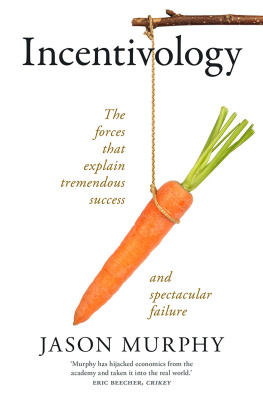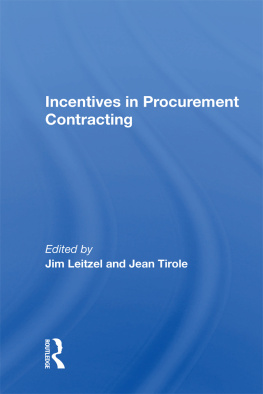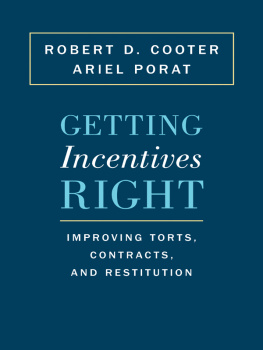Jason Murphy is an economist who has worked at the Australian Treasury, the Ministry of Finance of the Republic of Nauru, and the Australian Financial Review. He writes regularly for Crikey and News.com.au, blogs at thomasthethinkengine.com and has a passion for bringing economics into the everyday world.
To Mum and Dad. Thank you.
Contents
Let me take you back in time.
Its the 1980s. Im a small boy standing on an expanse of grass. From the sky, suddenly, arrives a projectile. It misses me narrowly and Im stunned.
My father is trying to teach me to catch. I am basically enjoying the process. But its straining against the limits imposed by a short lifetime spent mostly inside, mostly reading books.
I am uncoordinated and, worse, frightened of the ball. I catch a precious few, but too often I flinch. The ball bounces off my hands, off my arms, off my torso, spilling onto the grass of the public park near my family home.
The park seems, to a small boy, tremendously large. It has a cricket oval at one end and a grassy area at the other. There is a playground and a pathway and a cliff of exposed rock. (I later learn the park was once a quarry.) An old brickworks adjacent to the park has just been knocked down, and the dust being raised there now is from the construction of luxury housing.
I scurry to pick up the ball and throw it back towards my father. He collects the ball from where it lands and lobs it gently back to me. I do my best, pick up the ball, and throw it back.
Then I see my father tense his body. He bends his spine back so his face looks up into the blue sky, and draws his arm back. His arm springs upward and the ball is launched. It rises, higher and higher, until it appears tiny. I stand still on the grass, mouth agape, when I hear my fathers voice.
Ill give you a dollar if you catch it!
We will leave this scene here, with the ball paused at the top of its parabolic arc, father and son frozen in a sunny tableau fraught with tension and expectation. My athletic self-esteem hangs in the balance like Schrdingers cat, both alive and dead. I promise to resolve the story a little later.
But first, lets make sure were on the same page about incentives.
Reward and punishment are very different. Theyre like two mismatched characters thrown together in an action adventure movie. The duo dont get along but must go on a quest together. It is only over time that they discover what they have in common: an amazing power to make things happen.
We are about to meet this pair. Reward is first. We shall observe it in its natural habitat.
In 2016 an organisation called The Nature Conservancy put up a US$150,000 prize to anyone who could help them solve a major environmental problem: protecting marine life. Fishing boats in the Pacific Ocean haul from the briny deep all manner of species. Certain species of tuna in particular are overfished in contravention of the law, and the numbers being caught must be monitored. But how can we be certain what kinds of aquatic life are landing on deck?
Some Pacific fishing boats are fitted with cameras that record what is caught. Ingenious! But who will watch the videos? Paying marine experts to watch hour upon hour of flopping fish is one option, but the cost adds up. For every hour of fishing video collected, an expert must spend over 30 minutes classifying the catch. There are thousands of fishing vessels in the Pacific and they fish for weeks at a time.
This creates a viewing marathon that would outstrip even the most epic binge of Deadliest Catch, and with a lot less drama than that show. Using software to classify the fish being caught the same sort of software used in facial recognition could be a giant leap forward.
So could a machine-learning algorithm save time, save money and save marine life? The Nature Conservancy asked artificial intelligence experts to help find out.
The fisheries competition was run through a company called Kaggle. Kaggle uses prizes to motivate teams of people to solve problems in machine learning. (It was set up in 2010 by a young Australian entrepreneur called Anthony Goldbloom who, by chance, worked at the Australian Treasury at the same time as me.)
The power of the prize is enormous. The Nature Conservancy was able to attract a large volume of entries 2293, to be precise and among them was some top talent. The competition was won by a team of three machine-learning professionals with expertise in object classification who entered a sophisticated deep neural net solution. Their algorithm not only classified fish caught during the day, but also those visible only on night vision cameras.
Cash rewards are a major part of the appeal of Kaggle. The fishing prize is not the biggest bait theyve ever used. In 2017 a million-dollar Kaggle prize was offered to coders battling it out to create a better algorithm for estimating house values. A major real estate listing website called Zillow was the sponsor, and Zillow placed enormous faith in the answer the Kaggle competition provided. It began offering to buy certain houses, on the belief that this algorithm could tell the true value of a house. It was willing to put up the money to get the best result because it knew there would be long-term returns on that investment. And people were willing to put unpaid time into creating the best entry because of the potential cash reward.
But money is not the only appeal of Kaggle. The site provides gold, silver and bronze medals to entrants who may have missed cash prizes and hosts leaderboards that rank entrant performance across multiple competitions. Recognition accrues to the top-ranked individuals and teams. Social reward is a subtle but powerful part of the motivation and this is true in general, not just at Kaggle.
Incentives of course include formal honours and awards: titles, prizes, badges, stripes on your shoulder. But informal status markers count too how many people attend your parties, for example, and the contemporary equivalents: Twitter followers, Instagram likes, article clicks. Any system that can increase levels of social cachet can be used as an incentive, which is why social media has become an enormous incentive engine spitting out bizarre new rewards.
This books second lead is an altogether uglier character. If reward is the good cop, punishment is the bad cop. Punishment brings the pain.
Fines. Prison. Being yelled at. Being publicly shamed. Punishments work differently from rewards. If you set up an incentive system that includes a punishment, you hope never to apply the punishment itself. The threat alone is supposed to deter the activity.
A perfect example of punishment in action is in the famous Reinheitsgebot the German Beer Purity Law. Enacted in 1516 by Duke Wilhelm IV of Bavaria, the law stipulates the only permitted ingredients of beer: water, barley and hops (with yeast later added to the list). The reason that the law was enacted in the first place is disputed. Was it really about the purity of the beer, or was it about preserving wheat for use by bakers? History is murky, and the Reinheitsgebot has been the subject of numerous legal challenges, but it still exists to the current day.
What made the law stick? Why did brewers obey? The answer is punishment. The earliest versions of the Reinheitsgebot made deviations from the official recipe punishable by confiscation of the beer barrels, which would be done, according to the law, without mercy. The prospect of losing their product and therefore their source of income made brewers take notice.














